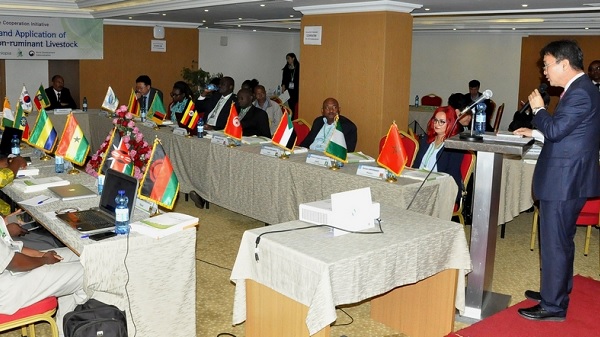
ADDIS ABABA (EIAR)–The Korea-Africa Food and Agriculture Cooperation Initiative (KAFACI) in collaboration with the Ethiopian Institute of Agricultural Research (EIAR) held a four-day workshop from 12 to 15 September, 2017, in Addis Ababa, to discuss with and share experiences among the implementers of the KAFACI-initiated project on “Development and Application of Management Techniques for Non-Ruminant Livestock”.
Launched in 2014 by KAFACI—an inter-governmental and multilateral cooperation body of the Rural Development Administration (RDA) of the Korean government that aims to achieve sustainable agriculture and enhance extension services in Africa—the project is implemented in 17 African countries, including Ethiopia, to enhance production and productivity of non-ruminant livestock in its member countries.
In Ethiopia, KAFACI has been working with EIAR in poultry with an objective to develop and apply management techniques for poultry production so as to enhance production and productivity, ensure nutrition security and increased income of communities, through various technical and capacity building supports. Prior to the development of management techniques for non-ruminant livestock, a survey on poultry production system and development of production manual to overcome gaps identified by the survey have been carried out.
Opening the workshop, Dr. Adugna Wakjira, former Deputy Director of EIAR, said that integrating traditional technologies and best practices from experienced countries like Korea into poultry and other livestock research and development efforts plays a crucial role in attaining the growth of the sector and that EIAR and KAFACI have been able to identify problems, potentials and intervention areas in poultry development so far, and that the capacity building efforts being made in the sector are playing a significant role in the ongoing transformation of the sector.
The fact that Korea went through a miraculous development pattern in the past 50 years provides a readily attainable option for countries like Ethiopia who are modeling and integrating Korean agriculture development models into their national development strategies.
He said that the poultry development programs developed and being undertaken by EIAR, which are aligned with the development program of the country, aim to address small- and small-scale farming communities who are now increasingly benefiting from modern poultry technologies and practices and ensuring their food and nutrition security as well as better livelihood from the relatively simple agricultural practice, and that the KAFACI-EIAR collaboration has a lot to offer in future undertakings.
RELATED: Ethiopia Launches National Horticulture Production and Marketing Strategy
Dr. Adugna also mentioned that the agricultural transformation efforts of the country have many challenges and that collaborative efforts are needed to alleviate constraints and bring about commendable results in this specific agricultural sector.
Dr. You-Lim Choi, Director General of the Department of Animal Biotechnology and Environment at the National Institute of Animal Science, RDA, said that many developing countries have interest in the success of Korea who raised agricultural productivity and developed rural villages through agriculture research and technological diffusion after the Korean War, and that RDA desires to share the experience of agriculture and rural development through the technology cooperation with developing countries.
That project on Development and Application of Management Technique for Non-ruminant Livestock aims to increase self-dependency and income of farmers in livestock by putting into practice the manual on poultry farming technology which was published in the last two years, he said. He explained that the manuals for each member country were published with an emphasis on small-scale poultry farming technology applicable to local community that considers the environment and economic scale of each country.
He said that the workshop would establish strategies for the development of poultry breeding technology model applicable to the field in Africa through review of work progress conducted so far and sharing of information.
The workshop was attended by research coordinators of the 17 KAFACI member countries, i.e., Angola, Cameroon, Cote d’Ivoire, DRC, Ethiopia, Gabon, Ghana, Kenya, Malawi, Morocco, Nigeria, Senegal, Sudan, Tunisia, Uganda, Zimbabwe, and the Republic of Korea.
Source: EIAR
——
Other stories:
- Transforming Ethiopia’s Livestock Sector
- The Insurance Provided by Ethiopian Livestock
- Importers Approve Ethiopia’s Livestock Quarantine System
- Need for Improved Technological Applications Stressed to Enhance Livestock Production
- Training for Women and Men Livestock Keepers Enhances Animal Health Interventions in Ethiopia
